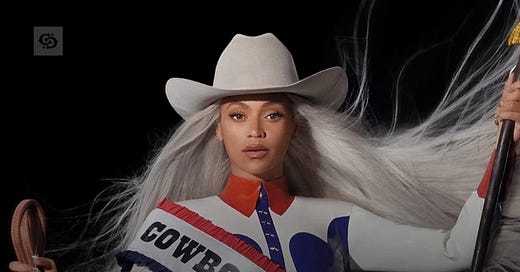Where All Voices are Equal
Reimagining Country (and America) with "Cowboy Carter"
Last night the Grammys recognized the prophetic power and divine artistry of Beyoncé’s “Cowboy Carter” and I am here for it!!!
Beyoncé won best Country Album and 2025 Album of the Year! I can’t read the minds of Grammy voters, but here is a word on why I believe the universe bent toward justice last night.
With her groundbreaking album, “Cowboy Carter,” Beyoncé performed a profound act of truth-telling and repair. I once browsed through a seminary bookstore and stumbled across a book entitled, Country Music: The Soul of White Folk. This is deeply problematic because Country Music is a creole creation. Born of African instruments and artistry, English ballads, Irish rhythms, Spanish harmonies—all against the backdrop of Indigenous resistance. Country Music was birthed in the wilderness of America’s creation.
In the foggy hills of North Carolina’s Smoky Mountains, self-emancipated Africans encountered disenfranchised former indentured servants and shared music. In Carter’s context, on the frontier of American expansion in Louisiana and Texas, African-American, English, Irish, Spanish and Indigenous were all present. They were there, shaping embodied Country experience and culture.
To be deemed Country, the music must do three things—and only three things:
Tell a story
Use acoustic instruments (and/or electric guitar)
Use simple melodies, usually built around 3 chords
This is the truth erased by the mythology of Country’s whiteness. To be sung by or for white people is not a requirement.
With “Cowboy Carter,” Beyoncé performed a divine restructuring of Country Music. She moved Whiteness from the center and replaced it with actual European cultures (English, Irish, Spanish), mostly maintaining the core ingredients of Country music. Then she placed those European cultural influences in a larger conversation with African and African American cultures—all of which were present in the wilderness of Country’s birth.
To listen to “Cowboy Carter” is to imagine the West without whiteness centered. It is to imagine an America where all voices are equal around the circle.
To insist that “Cowboy Carter” is not a Country album—as the Country Music Awards did when its judges failed to include Beyoncé’s genius in a single nomination—is to attempt to protect and maintain the myth of whiteness and its supremacy.
Congratulations, Beyoncé.
And “Thank you.”
The Narrative Gap, as coined by Lisa Sharon Harper, is the distance between the stories that we tell ourselves about ourselves, including how we got here and what it will take to make things right. In our world today, competing narratives vie for our loyalty, dividing society and the church, therefore making justice impossible. Our mission is help communities shrink the narrative gap, by identifying core issues and building community capacity so they might work toward common solutions for a just world. Here on the Freedom Road Substack, we can converse together on ways to shrink that narrative gap and help ensure everyones’ stories are told.
Connect
Freedom Road Instagram | Facebook | Threads | Website | Patreon | Podcast






